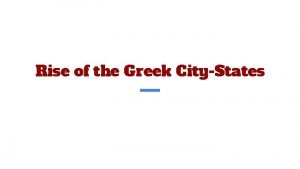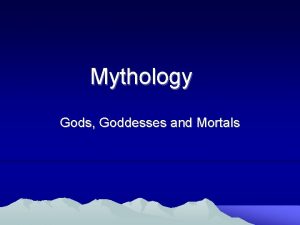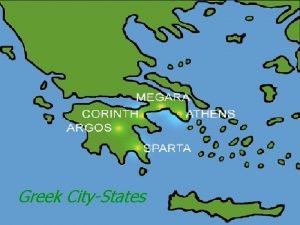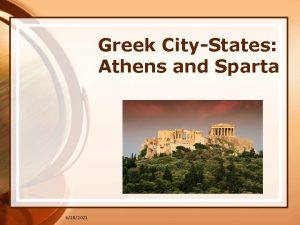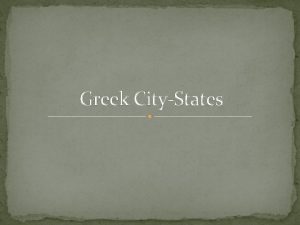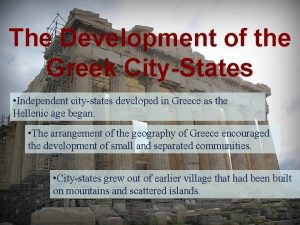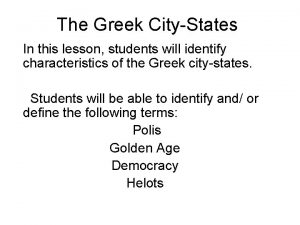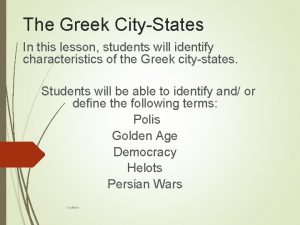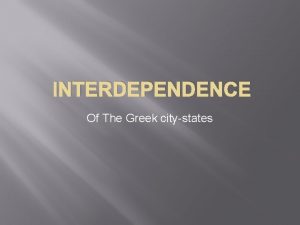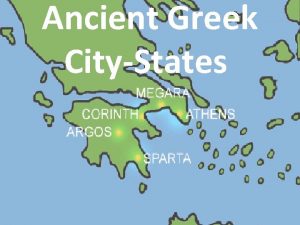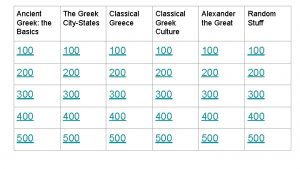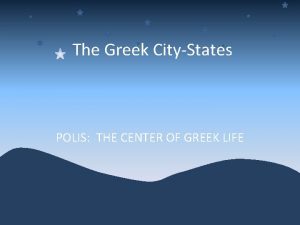The Greek CityStates In this lesson students will


















- Slides: 18

The Greek City-States In this lesson, students will identify characteristics of the Greek city-states. Students will be able to identify and/ or define the following terms: Polis Golden Age Democracy Helots E. Napp

E. Napp

E. Napp

Mountains separated the Greek city-states. E. Napp

Geography impacts Greece • Because of the hilly terrain Greek states remained separate from each other. • Though the Greeks shared a common language and religion, they never developed a unified system of government. • The Greeks lived in separate, independent citystates. • The Greek word for a “city-state” was a polis. E. Napp

Layout of a Polis A typical polis was built around a high area called an acropolis (uh-KRAHP-uh-luhs). In addition to fortifications, the acropolis usually housed temples to the gods and spaces for public ceremonies. Below the acropolis were other public places, like the agora (A-guh-ruh), or marketplace, where people did business, gossiped, and discussed politics. Shops, houses, and more temples surrounded the agora. Surrounding the entire polis was a sturdy wall for defense.

This magnificent building is the Parthenon. The Parthenon was a temple in Athens, a Greek polis. E. Napp

Athens • Athens was an important polis in ancient Greece. • The people of Athens developed democracy. • Democracy is a system of government where citizens vote or participate in government. E. Napp

In Athenian democracy, only free men born in Athens could vote. Women, slaves, and foreigners could not vote. E. Napp

The Golden Age of Athens • Athens experienced a golden age. • A golden age is a time of peace, prosperity, and great achievements. • The Athenians produced great works of literature, philosophy, and art. E. Napp

This is a painting of the famous Athenian philosopher, Socrates. He encouraged his followers to ask questions. His method of questioning things has become known as the Socratic method

Sparta was another important Greek polis. E. Napp

Sparta • Sparta was a militaristic polis. • In Sparta, all men had to serve in the military. • Weak or disabled babies were left to die. E. Napp

A Spartan’s life revolved around the military. A Spartan man was a soldier for most of his life. E. Napp

Helots • The Spartans had helots or slaves. • The helots farmed for the Spartans. • While the helots farmed, the Spartans focused on military affairs. • Life in Sparta differed greatly from life in Athens.

Greek Legacy • Greek culture is considered the foundation of western society- including the United States. • The Greeks gave us unique forms of government, unique forms of architecture, philosophy, literature, and • lots and lots of words- E. Napp

Greek root Basic meaning Example words – anthrop- human misanthrope, philanthropy, chron- time dem- people anachronism, chronicle, synchronize, democracy, demography, path- feeling, suffering empathy, sympathy, ped- child, children pediatrician, philo-, -phil- having a strong affinity or love for phon- sound philanthropy, philharmonic, philosophy polyphonic, cacophony, E. Napp

Questions for Reflection: • What was a polis and why did the Greeks develop the polis? • Define a golden age and name a Greek polis that experienced a golden age. • List three differences between the ancient Greek polis of Athens and Sparta. • Who were the helots and how were they treated? • Describe Athenian democracy. E. Napp
 Socratic problem
Socratic problem Agora
Agora Rizal's salute to luna and hidalgo
Rizal's salute to luna and hidalgo What is the greek miracle in greek mythology
What is the greek miracle in greek mythology By the end of the lesson, students will be able to
By the end of the lesson, students will be able to Hình ảnh bộ gõ cơ thể búng tay
Hình ảnh bộ gõ cơ thể búng tay Lp html
Lp html Bổ thể
Bổ thể Tỉ lệ cơ thể trẻ em
Tỉ lệ cơ thể trẻ em Voi kéo gỗ như thế nào
Voi kéo gỗ như thế nào Thang điểm glasgow
Thang điểm glasgow Chúa yêu trần thế alleluia
Chúa yêu trần thế alleluia Các môn thể thao bắt đầu bằng tiếng nhảy
Các môn thể thao bắt đầu bằng tiếng nhảy Thế nào là hệ số cao nhất
Thế nào là hệ số cao nhất Các châu lục và đại dương trên thế giới
Các châu lục và đại dương trên thế giới Cong thức tính động năng
Cong thức tính động năng Trời xanh đây là của chúng ta thể thơ
Trời xanh đây là của chúng ta thể thơ Cách giải mật thư tọa độ
Cách giải mật thư tọa độ Phép trừ bù
Phép trừ bù
